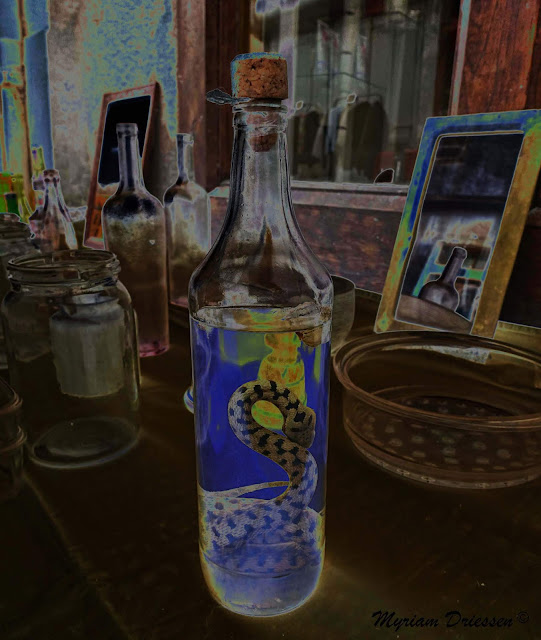Sur le pavé de
la brocante de Sorèze (photo solarisée)
Cette
phrase de Nietzsche s’applique peut-être à cette étonnante bouteille de thériaque
vue dans la superbe brocante de Sorèze en
août dernier. Je n’ai pas testé.
La thériaque,
appelée θηριακή (thēriakē) par les Grecs de θηρίον (thērion), "animal sauvage, bête" est
un célèbre contrepoison rapporté à Rome par Pompée, puis
complété par Andromaque, médecin de Néron. La recette comprend un
mélange de plus de cinquante drogues, plantes et autres ingrédients, dont
la vipère.
Le
vin de serpent est encore une boisson alcoolisée dans laquelle on
fait macérer un ensemble de serpents venimeux placés dans la bouteille. On le
trouve au Vietnam et en Asie du Sud. Les serpents y sont largement
considérés comme possédants des qualités médicinales. Toutefois leur venin
dissous dans la liqueur est dénaturé par l'éthanol. Il est illégal
d'importer de l'alcool de serpent dans de nombreux pays car des serpents
utilisés sont des espèces en voie de disparition.
Laissons
ces breuvages aux plus courageux, comme l'était toute l’équipe des bronzés :
Nietzsche wrote “That which does not
kill us makes us stronger ». This may be true for this theriac old bottle
I saw in the fleamarket of the nearby city of Sorèze. I did
not check.
The word theriac comes from the Greek term θηριακή (thēriakē), from θηρίον (thērion), "wild animal, beast". It was
a medical concoction originally formulated by the Greeks in the 1st
century AD and widely adopted in the ancient world as far away as Persia, China and India via
the trading links of the Silk Route. Made of more than fifty drugs, plants
other ingredients including viper, it was an alexipharmic, or antidote,
considered a panacea.
Snake wine is an alcoholic beverage produced by infusing
whole snakes in rice wine or grain alcohol. The drink
was first recorded to have been consumed in China during the Western
Zhou dynasty (ca. 1040–770 BC) and considered an important curative and
believed to reinvigorate a person according to Traditional Chinese medicine. It
can be found in China, Goa (India), Vietnam, and throughout Southeast
Asia.
The snakes, preferably venomous ones,
are not usually preserved for their meat but to have their "essence"
and snake venom dissolved in the liquor. The snake venom poses no threat to the
drinker. It is denatured by the ethanol and would be denatured by stomach
acid anyway.
Trade of these products is limited as many of the snakes are in danger
species.

Aucun commentaire:
Enregistrer un commentaire